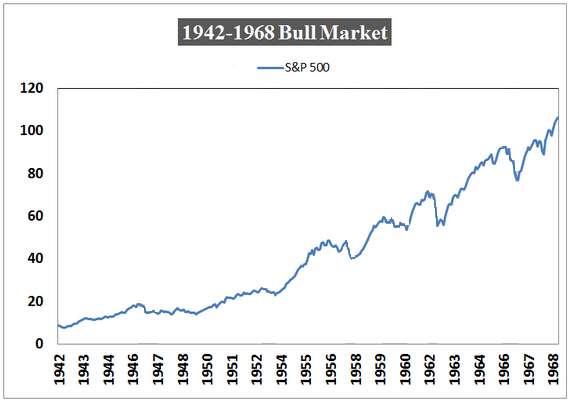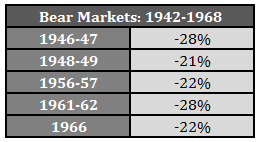Investors throw around the terms bull market and bear market with ease, but there are so many different ways to define them that it can be somewhat confusing. For some reason, a 20% gain is considered a bull market while a 20% loss is considered a bear market. Why not 19% or 21% or another level completely? You got me. And then there are cyclical bulls within secular bears just like there are cyclical bears within secular bulls.
It can also be difficult to define the start of a bull market. Everyone assumes the current run in stocks started when the market bottomed out in early March of 2009. But is that really the start date or should we go by the date when we passed through the previous 2007 high which wasn’t breached until 2013?
There is also an assumption being made by investors that this bull market must “end badly” because they always do. The two prior crashes from 2000-2002 and 2007-2009 are fresh in everyone’s memory so it’s easy to draw parallels to those scenarios after the latest run-up. Good luck going a week without hearing about how eerily similar things are to the tops in 2000 and 2007. Seeing the market get cut in half seems like a natural conclusion to this bull market.
Is it possible we see the market get crushed again? Sure, you can never rule anything out. But can we really draw concrete conclusions about what’s going to happen based on a sample size of two, maybe four if you include the Great Depression and 1973-74? What if this doesn’t end in a crash, but just a run-of-the-mill bear market?
That’s exactly what happened to the enormous bull market of the 1940s, 50s and 60s. Market historians may disagree with the date range of the bull market here, but from 1942-1968 the S&P 500 returned nearly 15% per year. This was a pretty remarkable run over almost 30 years:

One of the most remarkable aspects of this massive bull market is that it doesn’t get much respect historically. The reason for this is because it never crashed and burned. Investors don’t always remember the big gains, but everyone remembers the market crashes. It’s why 1929, 1987, 2000 and 2007 are discussed so often. Losses leave lasting scars on investors, but not this particular market cycle because you can’t really point to a market-wide bursting of a bubble.
This doesn’t mean there were no losses along the way. There were many bear markets over this time frame:
 We should also make a distinction between a bear market and a crash. My made-up definition of a crash would be anything in excess of a 40% loss. A true market crash didn’t occur until the brutal 1973-74 bear market that saw the market fall close to 50%. In fact, from 1938 to 1973 there were zero market crashes. That’s almost 40 years without a single crash in U.S. stocks.
We should also make a distinction between a bear market and a crash. My made-up definition of a crash would be anything in excess of a 40% loss. A true market crash didn’t occur until the brutal 1973-74 bear market that saw the market fall close to 50%. In fact, from 1938 to 1973 there were zero market crashes. That’s almost 40 years without a single crash in U.S. stocks.
You had the Great Depression that saw stocks fall more than 80% from 1929-32 and then the 1937 echo crash of more than 50% and then nothing for almost four decades in terms of a bubble-induced market crashes.
The worst loss in this period came at the tail end of the bull market as stocks dropped by 36% from 1968-1970. There were also two bear markets from 1938-1940 (with losses of -24% and -29%) before stocks really took off in 1942, but again, these types of bear markets should be expected by investors. Add this all up and from 1938-1973 there was a bear market every 4.5 years with an average loss close to 27%, yet no crash to deal with.
It would be nice if we knew ahead of time exactly how these cycles will react during their inevitable drawdowns along with pinpoint accuracy on the timing. Many investors seem to think that they know with 100% certainty how this particular bull market will come to an end, to which my reply would be, “good luck.” It’s impossible to predict how much damage a panic in the markets can inflict on the downside. The magnitude and timing of these events is almost impossible to forecast. Ask anyone who’s been calling for a crash since 2009 how that’s worked out.
If your time horizon in the markets can be measured in decades you can be sure that you’ll experience at least one spectacular market crash, probably more. But if you think you know exactly how this current market cycle, or any for that matter, will end you’re kidding yourself. No one knows for sure. That’s what makes the markets interesting.
Further Reading:
Would a Repeat of the 1987 Crash Really Be That Bad?

Great article. For some interesting real-time thoughts on this bull market in general, you can see Ben Graham’s general market commentary in the different editions of the Intelligent Investor, including comments after the bull market ended in the last edition.
Any good passages you’d be willing to share.
[…] – Bloomberg Chinese Are Piling Money Into Stocks Instead of Buying Cars – Bloomberg The Bull Market That Didn’t End in a Crash – Wealth of Common Sense The Horrid “Cash on the Sidelines” Myth is Still Haunting us! […]
Thank you for writing this piece it gives a perspective that isn’t heard all that often, probably because doom and gloom sells better. Interestingly, Barry Ritholtz’s Washington Post article addressed what to do now to prepare for the next 20% market downturn.
I didn’t read the Post article, and have no plans to do do. There is no way to prepare. No way to know when it will happen, so if you prepare now, you may be making a wrong move for years to come.
Preparing and planning is much different than actually doing something. Read Barry’s article and you’ll notice he’s not saying go to cash. He’s saying have a plan in place and understand your tolerance for risk, otherwise you’ll make some poor choices when a bear market does hit.
In that case the only good plan is to have the right asset allocation and ride it out. Making a change of any kind is tough because there’s no advance notice of a top or bottom.
Works for me. The biggest problem most individual investors have is that they just don’t have a plan in place to begin with. Of course, following the plan is important too. Eve the best strategy is worthless if you can’t or won’t force yourself to follow it.
Thanks Jon. I saw Barry’s article and agree with what he was saying. I wrote something about this last year if you’re interested:
https://awealthofcommonsense.com/preserve-capital-bear-market/
Doom & gloom is one thing but there are plenty of facts damning this bear market that Ritholtz has cast aside now that he is an asset gatherer. 10-year returns are expected to be almost 0 from these levels. Almost every valuation indicator except trailing PE is at the highest level ever ex- 99-2000, the greatest market bubble in a lifetime. There is pretty much no reason to own US stocks right now as plenty of other markets are much cheaper.
US stocks and corporate bonds are artificially priced and its not sustainable. Gov bonds will do okay because the Fed and other CB’s will force rates lower with huge QE. Cant let rates rise because sovereign debt burdens will spiral out of control. We’ve seen nothing yet with Gold. It will bottom in a few months and creep higher as the stock market comes off. US stocks are headed for a tough 3-5 years but will begin a secular bull after that.
That’s not what he says at all. Read the Ritholtz piece:
http://www.washingtonpost.com/business/get-there/your-portfolio-may-be-basking-in-the-sun-but-as-always-winter-is-coming/2015/06/05/4a4c621e-0b01-11e5-95fd-d580f1c5d44e_story.html
Thank you for writing this. Truely puts everything in perspective for me. We are currently working for our selves showing people how to get cash back for shopping online at their favorite stores. The membeship is totally free. Start getting your cash back like we do. http://takingcashback.com
[…] The Bull Market That Didn’t End in a Crash (A Wealth Of Common Sense) […]
[…] The bull market that didn’t end in a crash (Wealth of Common Sense) […]
[…] The Bull Market That Didn’t End in a Crash […]
[…] “If your time horizon in the markets can be measured in decades you can be sure that you’ll experience at least one spectacular market crash, probably more. But if you think you know exactly how this current market cycle, or any for that matter, will end you’re kidding yourself. No one knows for sure. That’s what makes the markets interesting.” – Ben Carson source […]